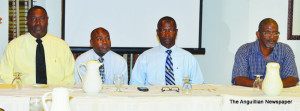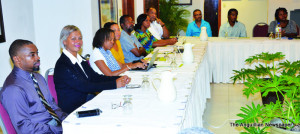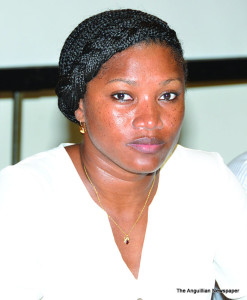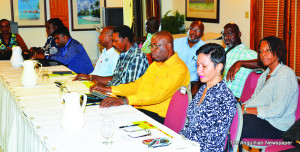


The unrelenting efforts by a number of persons to form a national Fisherfolk Organisation in Anguilla have paid off with a three-day Final Regional Training of Trainers workshop for fishery mentors.
The event, at Paradise Cove Boutique Hotel, began on Monday, July 6. It brought together representatives from seventeen Caribbean islands and organisations with funding from the European Union.
Among other matters the workshop, organised by the Caribbean Natural Resources Institute (CANARI), is part of an initiative to enhance food security from the fisheries sector in the Caribbean. One of the four objectives of the workshop is to enhance the understanding of fishfolk mentors in Anguilla – and the other participating islands – of the implications of key policies for sustainable small-scale fisheries development in the Caribbean. Another objective is to enable the mentors to become familiar with the positions of fisherfolk on key fisheries policies and related policies, and how they plan to engage in advocacy and awareness.
Anguilla’s Fisheries Advisor, Mr. Othlyn Vanterpool, speaking on behalf of the Minister, Mr. Curtis Richardson, supported those two objectives. “Too often, what we realise… is that policy-makers in the Caribbean, and further afield, implement policies without taking any regard for the impacts on our coastal resources – and how they would affect fisheries and other marine resources,” he said.
“In Anguilla, and the rest of the region, fishers need a voice. Too often they are taken for granted. The Fisherfolk Organisation must be that voice. The training and mentoring received here, and in the other islands, must be adequately utilised. When that is done, communities will listen; governments will listen and respect your positions. So let your voices be heard.”
On behalf of the Government of Anguilla, Mr. Vanterpool pledged its continuing support for fisheries development as well as for Fisherfolk Oganisations in Anguilla and the other regional islands.
Mr. Larry Franklin, Permanent Secretary in the Ministry of Fisheries in Anguilla, welcomed the various delegates from fisherfolk organisations – and partner agencies – to the workshop and to the island.
“Fishing in Anguilla, like the rest of the Caribbean, has been, and will continue to be, one of the key pillars of the way we live and of our economies,” he stated. “It is therefore important for our economic and social wellbeing that the overall objective of this regional project can be realised. That objective is to improve the contributions of the small fisheries sector to food security in the Caribbean.” He added that the overall objective was also to build the capacity of national and regional fisherfolk organisation networks to participate in fisheries governance and management.
One of the regional speakers was Dr. Patrick McConney, Senior Lecturer, Centre for Resource Management and Environmental Studies, University of the West Indies. He spoke on behalf the various partners in the workshop. “This project is very typical of the type of partnership, collaboration, joint initiatives and very intense friendships that CANARI reflects.” He stressed that “we should not underestimate the power of this partnership to really change the landscape within the Caribbean on topics that are entirely essential and therefore dear to most of us.”
Dr. McConney added: “CANARI and the [other] partners have certainly wholeheartedly joined in this effort to really make a difference that should be reflected in Caribbean wellbeing.”
The other regional speaker was Mr. Mitchell Lay, Coordinator for the Caribbean Network of Fisherfolk Organisations. He thanked the Government of Anguilla and Ms Kafi Gumbs, Director of Fisheries and Marine Resources, for affording CANARI and the Caribbean Network of Fisherfolk Organisations the privilege to host the workshop in Anguilla. He described the regional partnership as an important initiative and emphasised that “fishers ought to be in a position to impact those decisions that have some direct effect on their lives.”
He added: “We also feel very strongly that the fisheries sector is really underdeveloped, to a large extent, in terms of its potential contribution to national economies in our region.”
The opening ceremony was chaired by Ms. Gumbs, the Director of Fisheries and Marine Resources, who was a key player in having the workshop hosted in Anguilla.









